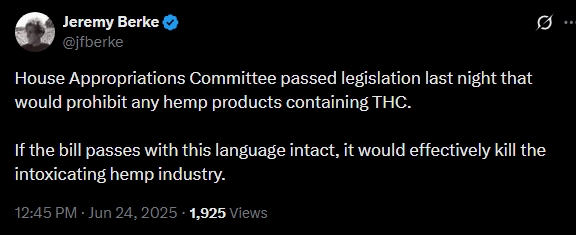Congress Moves to Ban Unregulated, Intoxicating Hemp Being Sold at Gas Stations Nationwide

WASHINGTON D.C. - In a late-session vote, House Republicans advanced a sweeping change to federal hemp policy that could outlaw a wide range of intoxicating hemp products, sometimes referred to as “gas station weed,” as the hemp Farm Bill loopholes become a major policy issue in many states, including California, Tennessee and Texas.

Two press releases from the House Appropriations Committee list “Key Takeaways” from the bill, including that it:
Supports the Trump Administration and the mandate of the American people by… closing the hemp loophole that has led to the widespread sale of unregulated intoxicating hemp products, including Delta-8 and hemp flower, through online platforms and gas stations nationwide.”
The move came during a June 23 markup of the House Appropriations Committee’s $25.523 billion spending bill for agriculture and the FDA. Tucked into the 138-page legislation is a provision that redefines hemp in a way that would make many hemp-derived products illegal, including those that contain THCA, delta-8 THC, and potentially non-intoxicating cannabinoids like CBD.
The intoxicating hemp provision was introduced by Rep. Andy Harris (R-MD), who chairs the Agriculture, Rural Development, Food and Drug Administration, and Related Agencies subcommittee on Appropriations.
Harris said his goal is to close a loophole created by the 2018 Farm Bill, which legalized the cultivation of industrial hemp but did not regulate the full range of intoxicating hemp products that have since flooded the market.
In his opening remarks, Harris said the legislation:
[C]loses the hemp loophole from the 2018 Farm Bill that has resulted in the proliferation of intoxicating cannabinoid products, including delta-8 and hemp flower being sold online and in gas stations nationwide under the false guise of being ‘USDA approved….As many states have stepped in to curb these dangerous products from reaching consumers, particularly children, it’s time for Congress to act to close this loophole, while protecting the legitimate industrial hemp industry."
The committee approved the bill in a 35-27 party-line vote on June 23.
The legislation would ban hemp-derived products containing synthetic compounds or any “quantifiable amount” of THC or THCA, or other cannabinoids that have similar effects on people or animals. The bill also empowers the Department of Health and Human Services to define what constitutes a quantifiable amount, giving regulators broad discretion over which products are allowed, and which are not.
The bill would maintain the legal status of “industrial hemp” under a revised definition that allows for the cultivation and sale of hemp grown for fiber, whole grain, oil, cake, nut, hull, microgreens, or “other edible hemp leaf products intended for human consumption.”
A Congressional Research Service report published June 13 warned that the provision would likely block the sale of most hemp-derived products, including CBD, unless they are manufactured using expensive, highly purified methods that remove all THC.
A revised version of the CRS report, released a week later, removed the reference to CBD but did not change the underlying interpretation of the policy impact.
When asked to clarify the scope of the ban, Harris offered a “manager” amendment stating that products with “trace or insignificant amounts of THC” would not be impacted.
Under current law, hemp is legal if it contains no more than 0.3% delta-9 THC by dry weight, a threshold that applies to the plant at harvest. Many consumer products—such as edibles, tinctures, and vapes—contain higher concentrations once processed, even if they start from compliant raw material.
The proposed change would eliminate that buffer, shifting the focus from raw hemp to finished goods. It could outlaw thousands of products currently sold in gas stations, wellness stores, and online.
Rep. Harris says he isn’t worried about any pushback from the U.S. Senate.
The bottom line is that you have some bad actors who are taking advantage of a loophole in the Farm Bill to sell psychoactive substances,” Harris told Marijuana Moment on June 25. “That was not the intention.”
The debate over intoxicating hemp is far from settled. But suppose this bill survives the whole appropriations process? In that case, the federal government will have fundamentally reshaped the legal definition of hemp, without a vote on a standalone bill, and perhaps with most Americans unaware it ever happened.
 Cara Brown McCormick
Cara Brown McCormick






